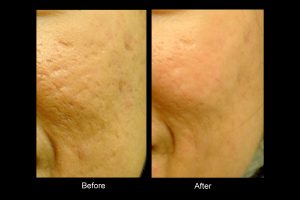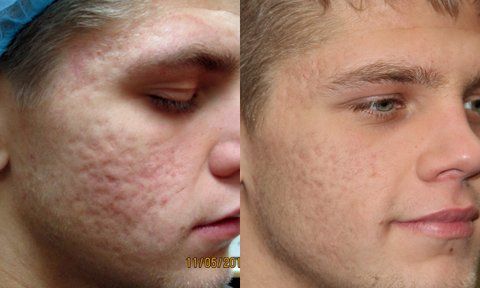How to Treat Acne Scars
Acne scars are one of the hardest things to treat effectively. Mostly, we can only improve them, not remove them. Each scar must be treated individually and sometimes a combination of treatments are needed. We’ll discuss some of the most common ways to treat acne scarring.
Skin needling
Skin needling uses very fine needles to break up the scar tissue and is much more effective than it used to be. Once we had to use manual rollers to roll over the skin which was often painful, caused bleeding and had a long recovery time. Now we have great needling guns similar to tattoo guns that cause a lot less trauma to the skin, are a lot more comfortable and have less downtime. The hope is that the body will replace the damaged tissue that we have caused through the needling with healthy tissue. The results are permanent
Dermal Fillers
Some acne scars can leave depressions in the skin and the best way to help these is to fill them with dermal fillers. Firstly, the scar is broken up by excising the base of the scar with a needle. This allows the adhesions that hold the scar down to be released so the dermal filler can lift them and fill. This treatment isn’t permanent, but usually has good longevity and only needs to be done yearly.
Vascular Lasers or IPL
Some acne scars can leave a brown or red mark. These marks need to be treated with lasers or IPL specially designed for pigmentation and vascular lesions. The results of this treatment are usually permanent. It can take more than one treatment to get the desired result.

Fractionated Lasers
These lasers work in a similar way to skin needling but instead of manually forming channels in the skin it is done with the laser. There are two types of fractionated lasers that work well for acne scarring. The first is the erbium laser, which is a medium depth laser. The second is carbon dioxide or CEO to laser, which goes deeper but does have a longer downtime. Which type of laser depends on the scar severity.
Peels and Microdermabrasion
Light chemical peels and microdermabrasion can slightly improve acne scarring, especially if superficial. You would be looking at having a minimum of ten treatments done weekly to achieve a result. If the scarring is moderate to severe and if the scars have formed depressions in the skin then stronger peels or dermabrasion can be used. These are done in a doctor’s rooms as they often require sedation or an anesthetic and require significant downtime.
Vitamin A and Vitamin C
Vitamin A and vitamin C penetrate the skin and aid in the healing of skin. In mild scarring they can help on their own but in most cases are best teamed with needling and lasers.
Treating Acne Scars
The best way to treat acne scarring is to not develop it in the first place. Acne can be treated with medications that are a lot better than they used to be. There is no need to suffer with acne and risk scarring. speak to your doctor about treatment options
Contact Us if you are interested in any of the treatments here


